The EU's final ruling is out, will Chinese automakers face another hurdle in going global?
![]() 11/01 2024
11/01 2024
![]() 491
491
A Chinese saying goes, 'When the mantis preys on the cicada, the oriole waits behind.' Another Chinese saying goes, 'A wise man adapts to circumstances.'
Regardless of domestic public opinion and opposition from relevant departments, the one-year EU anti-subsidy adjustment targeting Chinese electric vehicles has finally come to an end.
Ultimately, 27 EU member states voted 10 in favor, 5 against, and 12 abstained, supporting the imposition of tariffs of up to 45% for five years on electric vehicles exported from China to the EU. The European Commission subsequently stated, 'Despite disagreements among member states on this issue, the European Commission has obtained the necessary support for adopting tariff measures.'
According to the latest statement from the European Commission, on top of the existing 10% tariff, the following anti-subsidy duties will be imposed on Chinese exporters: 17.0% for BYD, 18.8% for Geely, 35.3% for SAIC, 20.7% for other cooperating companies; after filing a separate review request, Tesla will be subject to a tax rate of 7.8%; all other non-cooperating companies will bear a tariff of 35.3%, with the final tariffs to be imposed from October 31st.
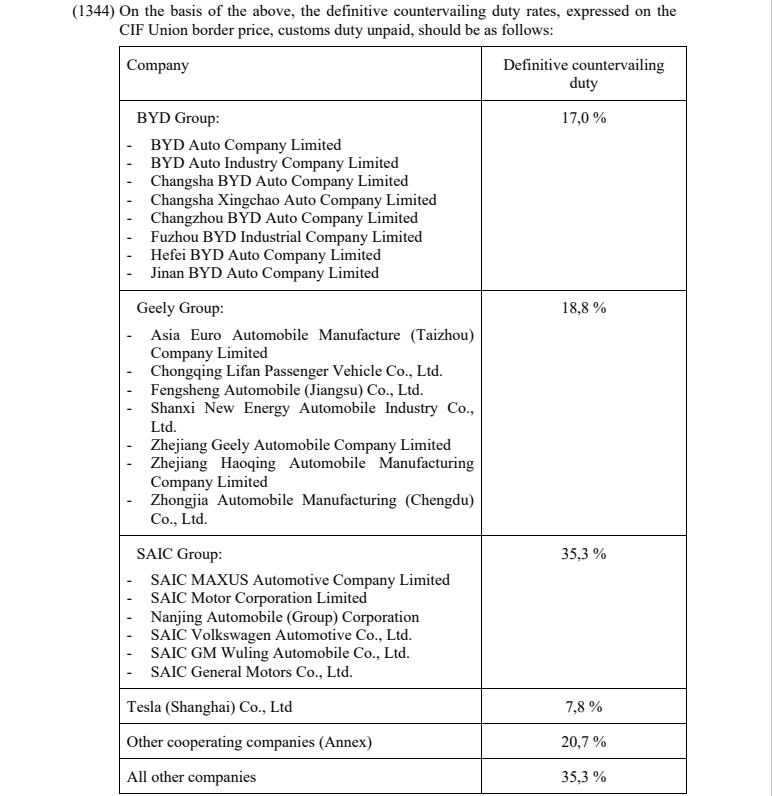
In response, a spokesperson for China's Ministry of Commerce stated that there are many unreasonable and non-compliant aspects in the EU's anti-subsidy investigation into Chinese electric vehicles, which is a protectionist practice that uses the name of 'fair competition' to practice 'unfair competition.' China does not recognize or accept the ruling results and has filed a lawsuit under the WTO dispute settlement mechanism.
Attitudes and Opinions of All Parties
A day after the final ruling on the anti-subsidy investigation, the spokesperson for China's Ministry of Commerce reiterated: 'The ruling does not comply with WTO rules and fails to address the core concerns of the Chinese and European industries. China does not recognize or accept this ruling.'
Meanwhile, shortly after announcing the final ruling, the EU suddenly announced that it would send officials to Beijing for consultations with China, 'aiming to find an alternative to imposing tariffs on Chinese electric vehicles.'
Bloomberg also reported on October 31st that despite this, negotiations between China and the EU may still continue. Even if tariffs come into effect, both sides can still reach an agreement through negotiations. The EU's decision to send officials to Beijing for further consultations indicates that the negotiations have made some progress.
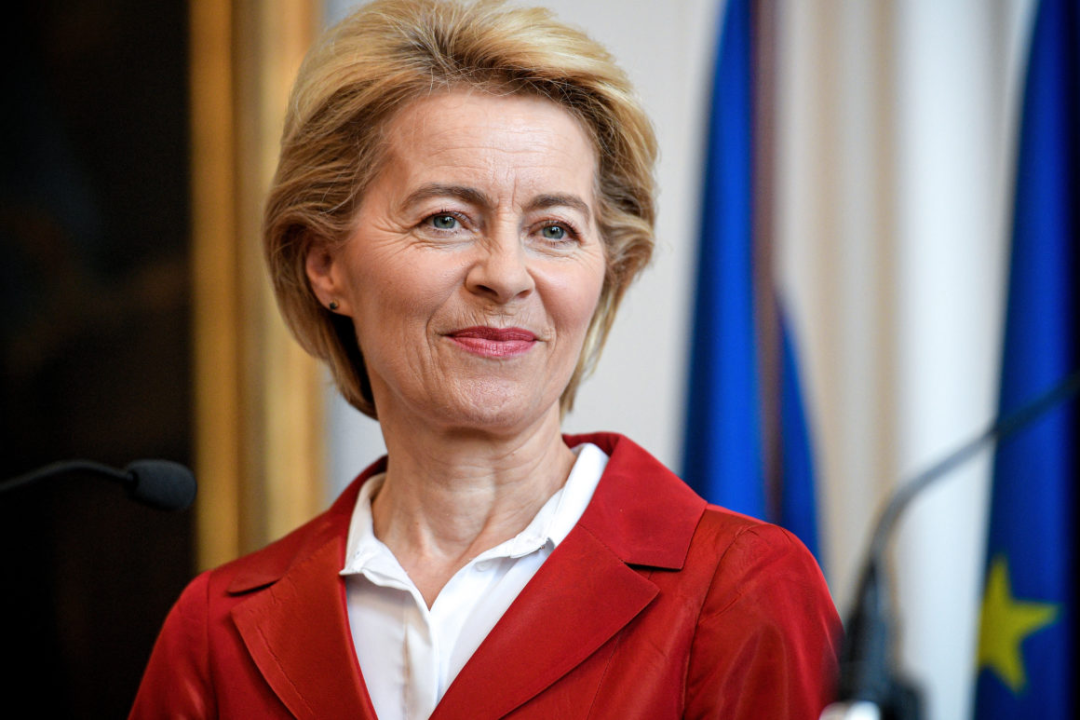
During this anti-subsidy investigation, the German government has been less supportive, even voting against it outright in the final vote. After the final ruling, the German Association of the Automotive Industry issued a strongly worded article stating that the EU's imposition of tariffs on Chinese electric vehicles is a setback for global free trade.
Hildegard Müller, president of the German Association of the Automotive Industry, stated that the EU's imposition of tariffs on electric vehicles imported from China is a setback for global free trade and has a negative impact on Europe's prosperity, employment, and economic growth. This move may escalate trade conflicts and ultimately harm the entire industry.
Müller said that trade disputes should be resolved through dialogue. She called on the government to take measures to enhance Germany's international competitiveness as a production and export country, promote market diversification, and encourage innovation to ensure Germany's continued active role on the global stage.
The implication is that although Germany has to enforce EU decisions within the EU, Germany can still cooperate more with China and should not be affected by this tariff policy. As the largest representative of European automotive investment in China, the German government's desire to survive is directly maximized.
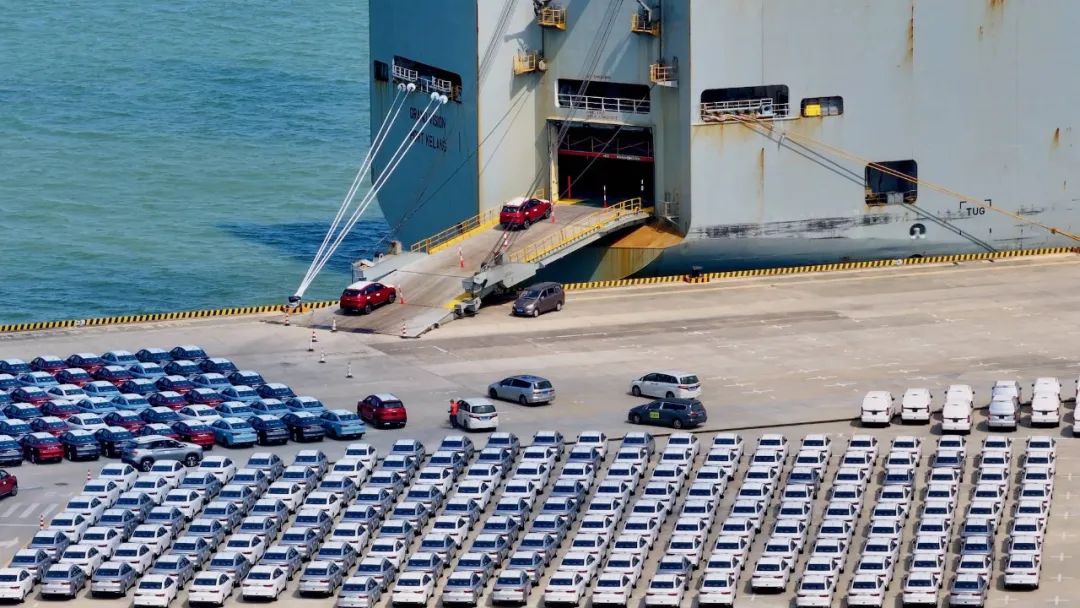
If Germany is motivated by interests, then Hungary, as an important bridge on the Belt and Road Initiative, must take a clear stance in this round.
Hungarian Foreign Minister Péter Szijjártó posted on social media that the European Commission ignored the opinions of member states and large European automakers and insisted on imposing tariffs on Chinese electric vehicles, which actually dealt a heavy blow to Europe's competitiveness. He said that the EU's approach does not serve European interests or those of European automakers, 'It is hard to imagine the success of the European electric vehicle strategy without the cooperation of Chinese suppliers.'
Boyan Tsokov, foreign policy adviser to the former Bulgarian Prime Minister and former secretary of the Security Council, was even more blunt, stating that China's increased investment in promoting green transformation is a model worth emulating by other countries. The EU's imposition of tariffs on Chinese electric vehicles is driven by political needs.
The phrase 'political needs' reveals the EU's facade and points out the underlying logic behind this round of anti-subsidy investigations.
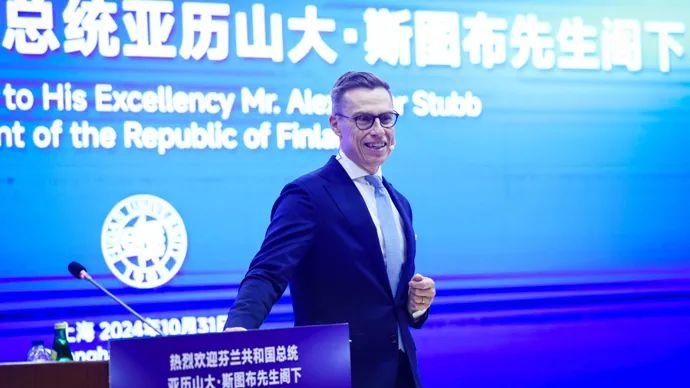
While the EU is wielding the tariff stick, various small EU countries have already set off for China, hoping not to be collateral damage.
Slovak Prime Minister Eduard Heger has already started his visit to China at this point. Before boarding the plane, Heger specifically expressed his opposition to a trade war with China. Imposing tariffs on Chinese electric vehicles is an unwise move that will cause great harm to Europe itself. He said, 'Chinese electric vehicles are ahead of Europe, and China's advanced production capacity can help Europe increase productivity.'
Meanwhile, Finland's national leaders visited China before the final ruling was announced, stating that Finland, as an EU member state, has a common trade policy with the outside world, and this issue cannot be decided by Finland alone. The purpose of his visit was to ensure that there were no misunderstandings between the two sides and that the EU and China could continue to communicate to resolve this issue. Meanwhile, electric vehicles only account for 2% of the overall trade between the EU and China, so even if the automotive business fails, other businesses will continue as usual.
Indeed, in the two rounds of internal voting, Finland consistently abstained. It seems that the EU is not monolithic, and the collapse of a fortress often begins from within.
Countermeasures or Protests
In the EU anti-subsidy investigation, various forces have their own agendas, with France, represented by the smaller countries, having the most ulterior motives. Moreover, it is widely acknowledged that France was the main driving force behind the entire incident, with Agence France-Presse also revealing that Macron 'suggested this matter to the EU in advance.'
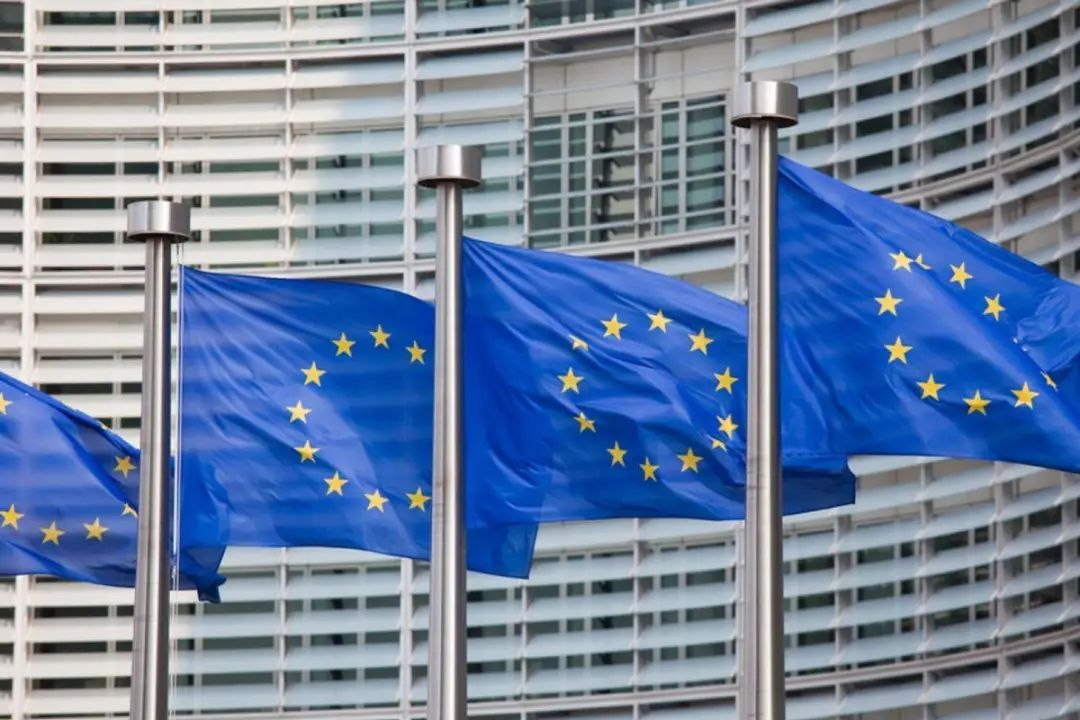
On September 13, 2023, the EU announced an investigation into subsidies for electric vehicles from a certain Eastern power. At that time, the United States had just announced a new tariff bill targeting China. Canada and Australia, two loyal allies, quickly followed suit. The United States also wanted the EU to show its loyalty, and France, partly out of self-interest to demonstrate its leadership, took on this dirty work and began lobbying within the EU.
On the other hand, this move was indeed beneficial to the domestic automotive industry, killing two birds with one stone.
Within a week, on September 18, 2023, France announced the launch of new cash subsidy measures for electric vehicles. The French even said that this is not a subsidy but a cash reward and quickly announced specific details, as if they were already prepared.
Germany, as France's long-time rival, has seen everything and even had officials in charge of industry say something particularly unpleasant. 'The French can't wait for China to retaliate so that they can play the role of bystanders and take advantage of the situation. If there's any cake to spit out, the French will be eager to grab it.'

After all, this approach is also a French tradition, and the idea of diverting disaster eastward, as embodied in the Maginot Line, was thoroughly implemented. Of course, the result was also unusually touching, akin to lifting a rock only to drop it on one's own head.
ATO Dynamics data shows that the average retail price of electric vehicles in Europe in 2023 was as high as €66,000 (approximately RMB 511,000), while the average retail price of Chinese electric vehicles during the same period was approximately €32,000 (approximately RMB 248,000), less than half of that in Europe. There are even models like the BYD Seagull with a price below €10,000 (approximately RMB 77,000).
Although many European automakers are also developing inexpensive models around €20,000, sales are far from expectations. France's leadership in conducting an anti-subsidy investigation within the EU is partly due to political needs related to US relations and partly due to its own market strategy. However, this drain-the-pond-to-catch-all approach is indeed short-sighted.
Recently, China's anti-dumping measures against EU brandy have also officially taken effect. On the eve of its implementation, senior French officials called China, and their tone was no longer as tough as before. As everyone knows, the wine industry is an important pillar industry in France, and almost all brandy exported from the EU comes from France.
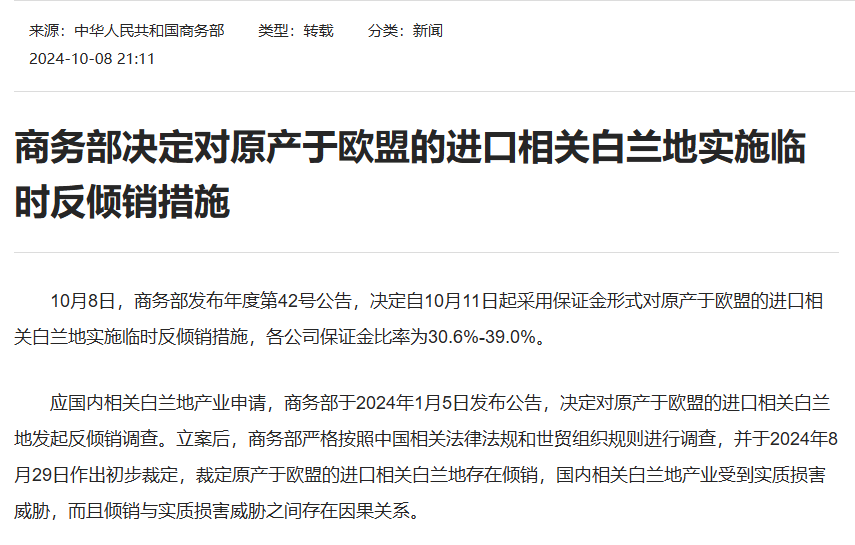
China's countermeasures will primarily affect France, and basically only France. During the call, senior French officials first expressed their views on recent China-France economic and trade relations and then began to 'frantically explain': France does not intend to target China and does not want to exclude Chinese products from the European market. This matter is negotiable, and an effective solution can definitely be found.
Sophie Primas, France's Deputy Minister of Trade, plans to visit China next week for talks with China's Minister of Commerce to discuss China's decision to impose tariffs on brandy imports and launch new investigations into the dairy and pork industries. The French newspaper L'Express reported that famous French cognac producers stated, 'Losing the Chinese market is unimaginable.' These veteran winemakers began demonstrations last month, demanding a postponement of the vote, but to no avail.
As China and France engage in a tariff war over electric vehicles, it is grape farmers who end up getting hurt. Since 1998, wine producers in the Cognac region of France have not mobilized like this before. This is indeed a critical moment. If they do not stand up to stop the government from making foolish decisions, France's wine industry may collapse.
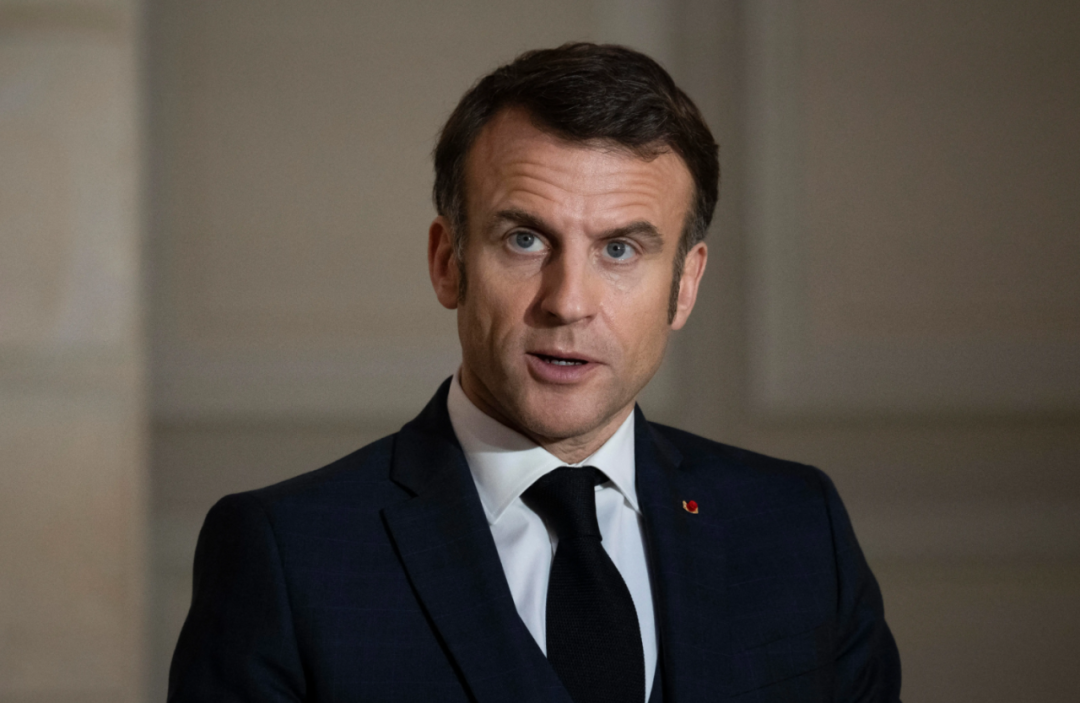
From a global perspective, the EU's anti-subsidy investigation is a transparent plan led by the United States to constrain China's Belt and Road Initiative, disrupting the calculations of Germany and a series of pro-China countries within the EU. France aims to profit from this situation, make China bow, and lead its allies to regain its status as the leader of the EU.
However, for Macron, the focus at this time should be on the US presidential election.
Amid the tense and exciting election, EU countries are coordinating strategies under the leadership of the European Commission and have established a 'rapid response force' - the 'Trump Task Force' - within the General Secretariat of the European Commission. This is to prepare for a series of potential black swan events that may arise, including Trump's possible withdrawal from NATO, ending the Russia-Ukraine conflict by favoring Russia, and the most terrifying scenario - igniting a new round of trade conflicts.
On October 29th, Trump declared that if elected, he would not make exceptions for Europe on trade issues, stating, 'Europe sells millions of cars in the United States, and they will have to pay a huge price.'
There is a world of difference between electric vehicles exported from China to the EU and those exported from the EU to the US. The EU's gaze should be directed not to the East but further west.
A Chinese saying goes, 'When the mantis preys on the cicada, the oriole waits behind.' Another Chinese saying goes, 'A wise man adapts to circumstances.'
Note: Some images are sourced from the internet. Please contact us for removal if there is any infringement.







